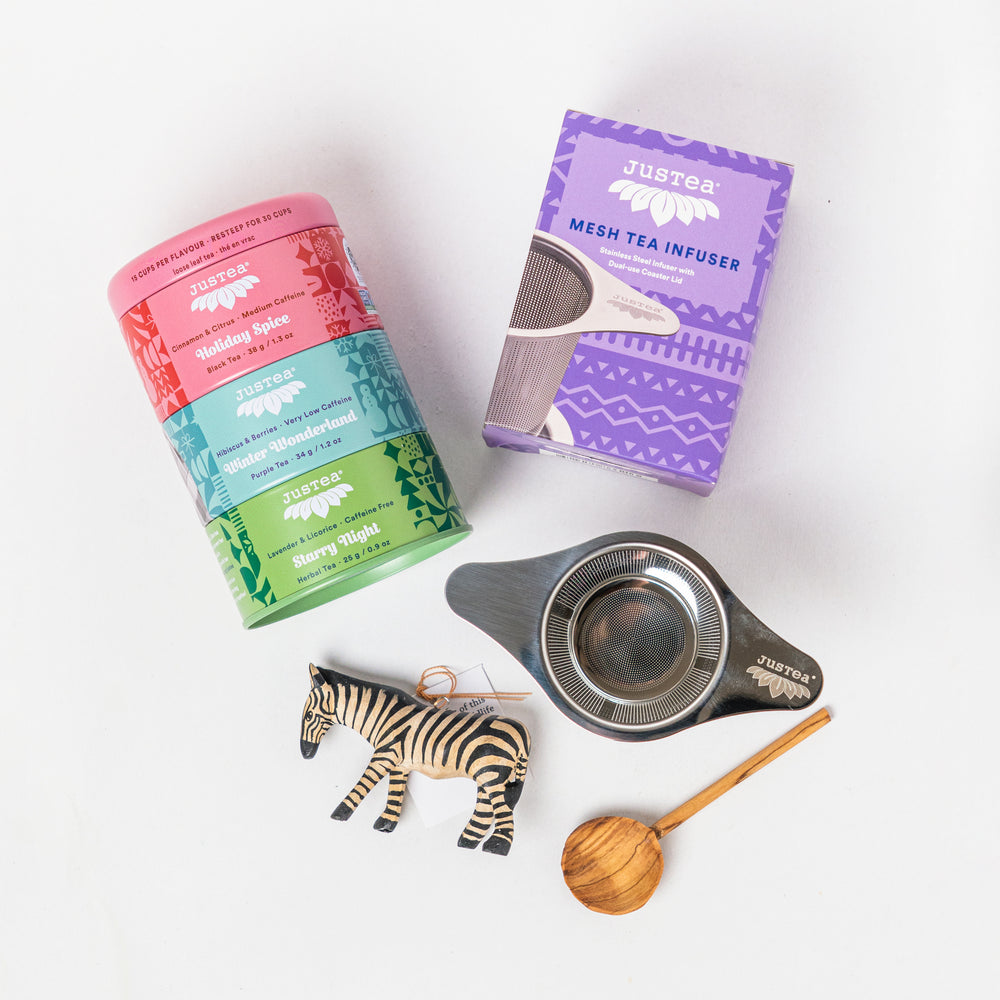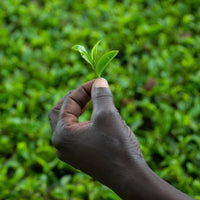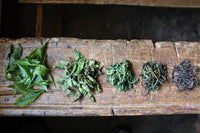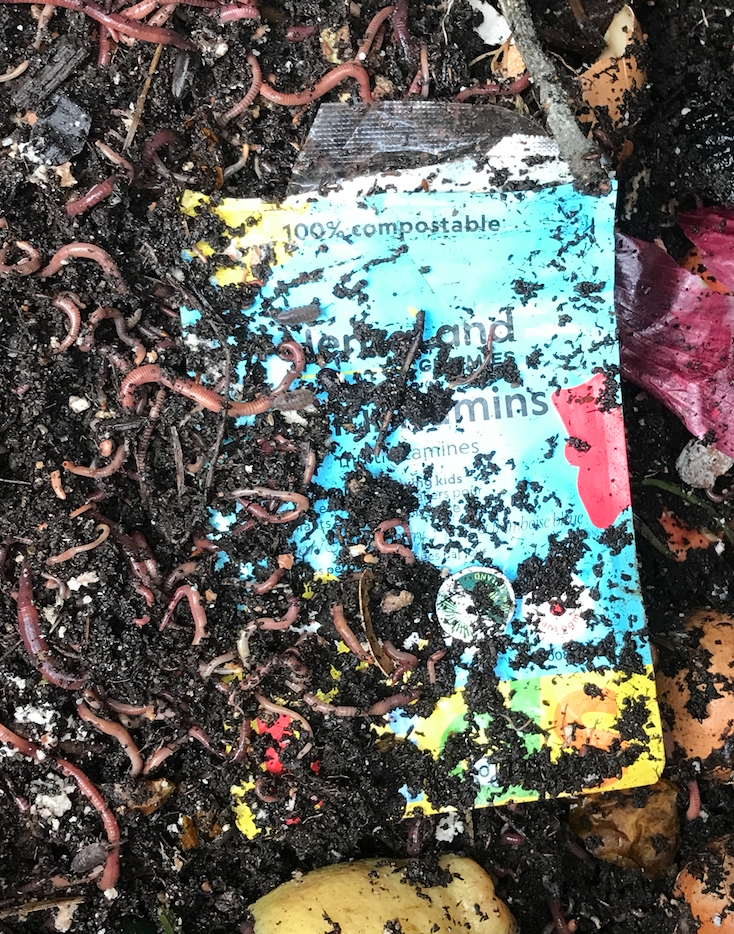By Paul Bain
July 29, 2022
Free shipping on orders over $50 in Canada & USA

JusTea offers the first and only farmer-direct tea from Kenya. If you like this blog post, check out the rest of our website.



By Paul Bain
Misleading claims on compostable packages
Look, I am super excited by the fact that every year more brands are responding to customer demand for more sustainable food packaging. Compostable packaging has become one of the hottest trends in the CPG industry. Unfortunately, most brands neglect to inform you that even though their packages are technically compostable, very few of us actually have access to compostable facilities that accept these packages. There simply is no place for these packages to get composted, so they end up in the landfill with every other type of garbage. These compostable packages won't decompose in the landfill because landfills are anaerobic environments (almost no oxygen) and decomposition is unable to occur without free oxygen.
Packages are typically advertised by companies as being compostable in one of 3 ways: Fully Compostable, Industrial (Commercial) Compostable, or Backyard Compostable. Here are the main problems with each of the 3 claims:
Fully Compostable: Not in any municipal compost
Sure, the package may be 100% compostable, but if you don't have access to a composting facility (which most people don’t), then this package is going to end up in a landfill. I have connected with a number of municipal compost facilities across Canada and the US, and I haven’t found a single one that accepts compostable food packaging (please let me know if you find one!).
The reason for this rejection is because these facilities have a strict period of time that is required for the materials to fully decompose (typically 3-4 weeks). Most packages that claim compostability take a minimum 10-12 weeks to fully decompose, so the municipal compost facility will reject these packages and send them to the landfill. This diversion to the landfill not only is a sad ending to a potentially earth-friendly package, but it also puts more strain on the composting facility to sift out the packages from their compost collection.
Industrial Compostable: Not accessible by the public
I appreciate that more brands are starting to make this qualifying statement, that their package needs to be dropped off at a Industrial Compostable facility, instead of merely throwing it in your green bin to be brought to the municipal compost (which in-turn will reject the package). Unfortunately, all the facilities I have talked with don’t offer a public drop-off for compostable packages and there are currently less than 200 facilities in all of North America.
These Industrial Compost facilities are in the business of making the highest value compost in order to sell it to farmers, garden shops, private gardeners, etc. These Industrial Composters set up private contracts with businesses, they pick up the business' compostable material and bring it to their facility (think the compostable bin at Whole Foods Market lunch seating). I called the Industrial Compost Facility that picks up the compost from the JusTea office kitchen and they said they would only accept a limited amount of compostable packages (approximately 2-3 packages per 60 litre bin) because these packages "frankly don’t make good compost".
So while the Industrial Compostable facilities will tolerate a longer decomposition timeframe of material (unlike the strict municipal timeframe of 3-4 weeks), the general public aren’t allowed to access these facilities, and the facilities don’t even really want these packages in their compost material.


Backyard Compostable: Not that I have seen
This one in more personal for me. Back in 2019, I was so excited to launch JusTea’s backyard compostable pouches. JusTea was going to be one of the first tea companies to offer customers a zero-waste, backyard compostable tea pouch. The idea was that a customer could buy a JusTea tea tin and then refill it with these pouches. It sounded like a great earth-friendly solution, so I did a lot of research and I was pleased to find a Canadian supplier who seemed to have the compostable packaging we were looking for!
I reviewed all the decomposition testing the supplier had conducted and it all looked good. JusTea made our first order, and once we received the packaging, I began doing our internal JusTea compost testing in my own backyard compost.
Sadly to say, but to this day none of the tea pouches I have put into my compost have fully decomposed. The supplier told us that the packages are supposed to be backyard and industrial compostable. But the packages are not composting in my backyard, and since I now know that customers aren't able to publicly access Industrial Compost Facilities, there is no place for these packages to get composted.
Over the past 3 years, I have also been adding other companies packages which claim backyard compostability to my compost... but none of these packages have decomposed either.
I am confident that my backyard compost is really active and churning out great compost. I turn it over regularly, ensure that moisture is correct, and there is a whole worm supercity cruising throughout the delicious mess. Yet while all the food scraps, garden clippings, and paper items that I have put in my compost have all fully decomposed, all these 'compostable packages' remain. I hope one of you readers may have had a better experience than I have... If so, please let me know!
I also am aware that even if these packages may eventually compost (after how many years?), the majority of households do not have access to a backyard compost, so this isn't a solution for most people anyways.
Of course, there is the expensive Lomi 'composter' you can buy for your apartment. But from my research, this device acts more as a 'shredder' and 'dehydrator', instead of actually creating good compost. Essentially, the Lomi just reduces the volume of your organic waste and makes it less stinky... the waste doesn't actually biodegrade and turn into compost.
I have recently come across some new packaging that claims a much faster backyard compostability timeframe and I am currently testing these packages in my compost. Unfortunately, the reason these packages can supposedly decompose much faster is because they are only shelf-stable for a maximum of 12 months. This means that if we were to put our tea in these packages, then after 12 months on the shelf the package starts to degrade. This compromises the freshness of our tea and raises potential food-safety issues.


Recyclable Pouches: Not a perfect solution, but the best one for now
I try to stay away from plastic. No doubt, the world has enough of it right now. Transitioning our packages to recyclable plastic was a really hard decision for me to make, but until there is an actual way for the majority of people to compost all the compostable packages, it is the best solution I can offer.
When you have used all the tea from our new pouches, I recommend washing them out and reusing them like a resealable ziplock bag in your kitchen. If you can't reuse them any longer, then it is time to recycle the pouch.
From my research, these pouches can be recycled in many cities through these options:
1. Leaving out in your recycle bin for curb-side pick-up. Please check your municipal recycling website to see what they accept. British Columbia currently does not accept this but there is some pilot testing in certain municipalities.
2. Dropping off at a recycle depot
3. Dropping off at retail stores with recycle boxes (such as London Drugs).
We designed the packages to ensure that we used one single type of recyclable plastic (#2 polyethylene), and there are no stickers on the pouches, which means that these packages can more easily be recycled at accepting facilities. Lots of other packages have mixed plastic layers, or are made from various different materials (such as plastic with stickers, or paper-lined plastic), and most recycling facilities can't accept these mixed material packages because they have specific recycle systems for each individual material.
Flexible plastic films are more difficult to recycle at facilities than rigid plastic because they can slide through the recycling sorting machines. From my understanding, many facilities are trying to update their systems to be able to bundle these plastics together and recycle them, but when this isn't possible, flexible plastics can be "recovered and produced into engineered fuel, an engineered energy product that is a direct replacement for traditional non-renewable resources, such as coal." https://recyclebc.ca/flexiblepackaging/
Alternative Package Solutions: Food Safety Problems Arise
Ideally we could just put the tea in a compostable or recyclable paper box and call it a day. This would be a fantastic earth-friendly solution and works for many items... but it can't work for food or beverage products because it isn't food safe.
Any paper material needs to have some sort of thin plastic coating to ensure it is food-safe and passes all food and beverage package regulations. That is why all the basic tea boxes you find in the grocery store, either have a plastic pouch on the inside containing the loose leaf tea, or individually wrapped tea bags inside the box. These individually wrapped tea bags are either made of a plastic film, plastic lined paper, or the same compostable material we have been discussing above (which has no place to get composted). Either way, we still feel that a single recyclable plastic pouch has a lower carbon footprint than a cardboard box with extra packaging on the inside.

I was also really interested in packaging our tea in those earth-friendly looking paper coffee bags that roll down at the top. But after more research, I have learned that all of these bags have a plastic liner in them, so this means that they can't be composted or recycled (since recycling facilities don't accept mixed materials in one package). These coffee pouches are going to end up in the landfill.
Continually trying to improve
We need to work together to get policy makers to prioritize creating facilities who will accept compostable packaging. We have the demand from consumers and businesses for compostable plastics, but without government investment info the composting systems available, all this innovation in compostable packages just goes to waste.
Sustainable food packaging is a rapidly evolving industry. Here at JusTea, we will continue to adopt new technologies as they come up which can provide you with a more earth-friendly option to enjoy our teas. We feel that our recyclable tea tins and these recyclable refill pouches are the best packaging options we can provide right now. If you have any suggestions or recommendations on packaging, please let us know!
You can reach me directly at 1-844-832-7827x1 or paul@justea.com
Thanks for learning with me,
Paul Bain - the JusTea Tea Captain :)
A few notes on how to reuse, repurpose, or recycle our other JusTea packages:
JusTea Loose Tea Tins and Trios:
We recommend buying 1 tin and then refilling it with the pouches. If you don't need to refill it with anymore tea, then you can always repurpose these durable tins for other kitchen items (like nuts, spices, grains, etc).
These tins can also find new life as a pen cup holder or they can be reused to hold small trinkets - my daughter keeps her marbles in a Purple Jasmine tin :)
Each tin is made from recyclable tinplate. They can be recycled in your curb-side blue bin for municipal recycling, or drop-off at any recycle depot. Before recycling, please pop out the plastic window in the lid (which can also go in your blue bin), so that each material is already separated for the recycling facility. To cut down on extra packaging, we print directly on the tinplate and don't place any extra stickers, making the tins easier to recycle and resulting in a lower carbon footprint.
We haven't been able to find a better solution to secure the hand-carved spoon on each tin and trio. We currently use a recyclable plastic film that can heat shrink on the tin, keeping the spoon secure and the lid tight for food-safety. Even if we didn't have a spoon on the tin, we still would need to keep the lid tight to the tin with plastic or some sticker adhesive.